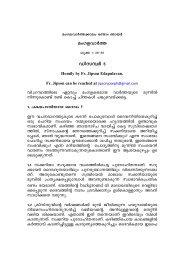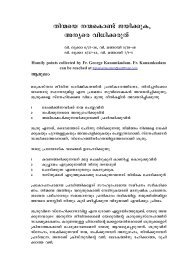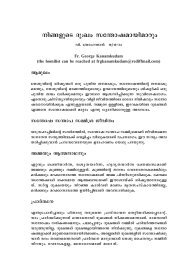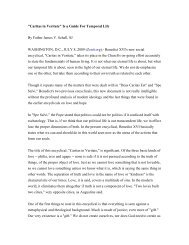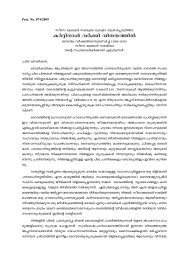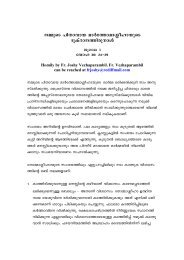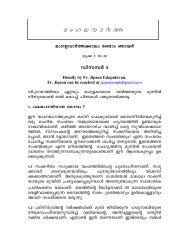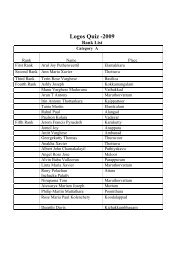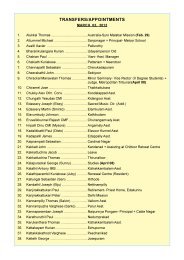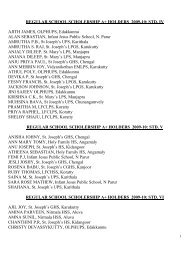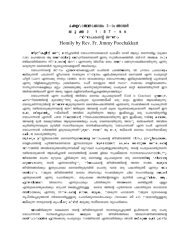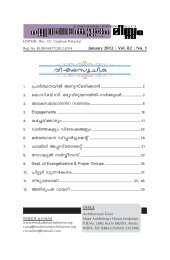THE TRINITARIAN COMMUNION - Archdiocese of Ernakulam ...
THE TRINITARIAN COMMUNION - Archdiocese of Ernakulam ...
THE TRINITARIAN COMMUNION - Archdiocese of Ernakulam ...
You also want an ePaper? Increase the reach of your titles
YUMPU automatically turns print PDFs into web optimized ePapers that Google loves.
God. Rather, we learn from Matthew 11:27 that Jesus Himself viewed this form <strong>of</strong> address forGod as the heart <strong>of</strong> that revelation which had been granted Him by the Father. In this term"Abba" the ultimate mystery <strong>of</strong> His mission and His authority is expressed. He, to whom theFather had granted full knowledge <strong>of</strong> God, had the messianic prerogative <strong>of</strong> addressing himwith the familiar address <strong>of</strong> a Son. This term "Abba" is a manner <strong>of</strong> speaking unique to Jesusand contains in a nutshell His message and His claim to have been sent from the Father. Thefinal point, and the most astonishing <strong>of</strong> all, however, has yet to be mentioned; in the Lord'sPrayer the Lord Jesus authorizes His disciples to repeat the word "Abba" after Him. He givesthem a share in His Sonship and empowers them, as His disciples, to speak with theirheavenly Father in just such a familiar, trusting way as a child would with his father. Yet Hegoes so far as to say that it is this new childlike relationship which first opens the doors toGod's reign: "Truly, I say to you, unless you become like children again, you will not findentrance into the kingdom <strong>of</strong> God" (Matthew 18:3). Children can say "Abba"! Only he who,through Jesus, lets himself be given the childlike trust which resides in the word "abba" findshis way into the kingdom <strong>of</strong> God. This the apostle Paul also understood; he says twice thatthere is no surer sign or guarantee <strong>of</strong> the possession <strong>of</strong> the Holy Spirit and <strong>of</strong> the gift <strong>of</strong>sonship than this, that a man makes bold to repeat this one word, "Abba, dear Father"(Romans 8:15; Galatians 4:6). Perhaps at this point we get some inkling why the Lord's Prayerwas not a commonplace in the early church and why it was spoken with such reverence andawe. "Make us worthy, O Lord, that we joyously and without presumption may make bold toinvoke Thee, the heavenly God, as Father, and to say, Our Father."48. Leonardo B<strong>of</strong>f, Trinity and Society, 32-33.49. Leonardo B<strong>of</strong>f, Trinity and Society, 34-35.50. These texts are not directly Trinitarian in themselves but deal with the Trinitarian thought andthey are significant in developing the doctrine <strong>of</strong> Trinity later by the Fathers <strong>of</strong> the Church andothers.51. These texts deal slightly with the understanding <strong>of</strong> God as Trinity. But they are useful to knowfor the development <strong>of</strong> Trinitarian understanding.52. “Go, therefore, make disciples <strong>of</strong> all the nations; baptize them in the name <strong>of</strong> the Father and <strong>of</strong>the Son and <strong>of</strong> the Holy Spirit” (Mt 28:19).53. Walter Kasper, The God <strong>of</strong> Jesus Christ, 245.54. “The grace <strong>of</strong> the Lord Jesus Christ, the love God and the fellowship <strong>of</strong> the Holy Spirit bewith you all.” (2 Cor 13:13).55. “But we feel that we must be continually thanking God for you, brothers whom the Lordloves, because God chose you from the beginning to be saved by the sanctifying Spirit and byfaith in the truth. Through the Good News that we brought he called you to this so that weshould share the glory <strong>of</strong> our Lord Jesus Christ.” (2 Thess 2:13-14).56. “There is a variety <strong>of</strong> gifts but always the same Spirit; there are all sorts <strong>of</strong> services to be done,but always to the same Lord; working in all sorts <strong>of</strong> different ways in different people, it is thesame God who is working in all <strong>of</strong> them.” (1 Cor 12:4-6).57. “The dogma <strong>of</strong> the Trinity is an absolute mystery which we do not understand even after it hasbeen revealed.” Raimundo Panikkar, The Trinity and the Religious Experience <strong>of</strong> Man: Icon-Person-Mystery (New York: Orbis Books, 1973), 50.58. Walter Kasper, The God <strong>of</strong> Jesus Christ, 251.59. “Heresies are doctrines which do not allow faith to find itself in them or devotion to recognizeitself in them, or formulations which contradict the normative data <strong>of</strong> the scriptures. Theyconstitute a grave danger to faith; nevertheless, they also enable theology to move forward,since their refutation requires careful study and a more precise deepening <strong>of</strong> faith itself.”Leonardo B<strong>of</strong>f, Trinity and Society, 46.60. ‘Doctrine’ as a noun means ‘a belief or set <strong>of</strong> beliefs held and taught by a Church, politicalparty, or other group.’61. From the early times Trinitarian theology developed two different approaches. In the patristictheology <strong>of</strong> the East the idea prevailed that the one God is God <strong>of</strong> the Father, and that the Sonand the Spirit share with Him His divine life. This conception had the merit <strong>of</strong> being based onScripture, but it could lend itself to misinterpretations. It could lead to subordinationist ideaswhich, in fact, did spring up in the east and came to a climax with the heresy <strong>of</strong> Arius. Theother conception, prominent in the West, conceived God as the one divine substance,comprising <strong>of</strong> Father, Son and Spirit. In this view, the unity <strong>of</strong> God and the equality <strong>of</strong> theFather, Son and Spirit were easily safeguarded; but, the basic truth <strong>of</strong> the oneness <strong>of</strong> the divinenature could be misunderstood in such a way as to lead to the denial <strong>of</strong> the real distinction <strong>of</strong>



